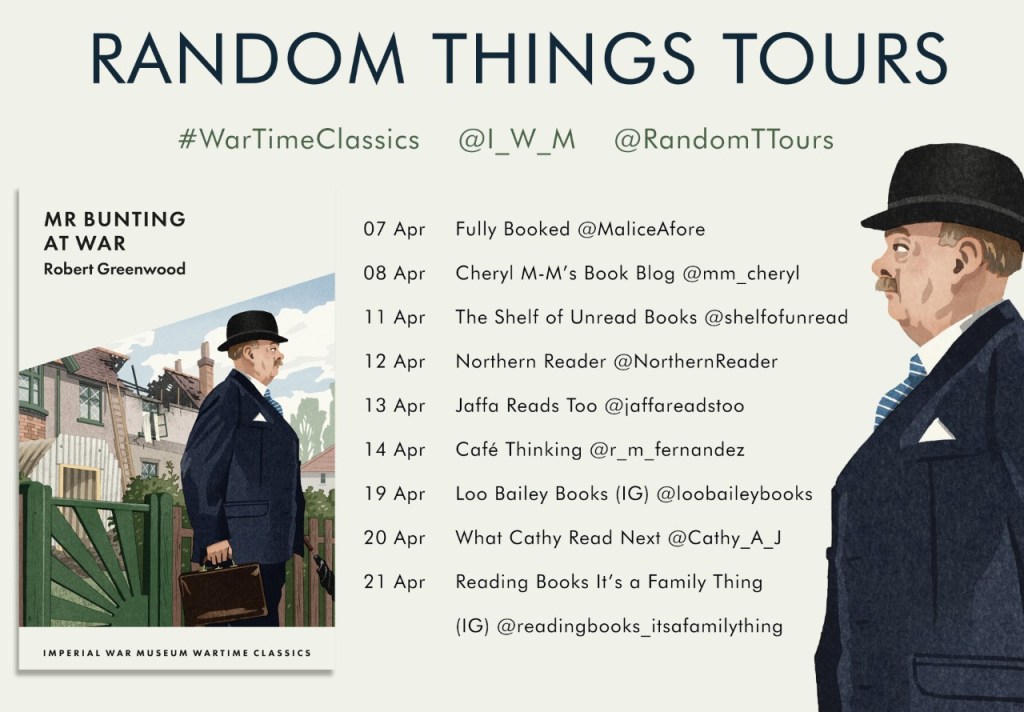‘You’re a good fellow, Bunting,’ said Mr Bickerton, boss of the legendary Brockleys department store. In peacetime this would be a big moment, but this is London during the Blitz. Mr Bunting’s world has been turned upside down.
Robert Greenwood wrote Mr Bunting at War in 1941. It was the second of what would become the Bunting trilogy, and it has now been reissued as a stand alone novel by the Imperial War Museum as part of its excellent Wartime Classics series.
Greenwood gives us something that is deceptively light. We assume that pre-war Bunting was something of a comic character: but this novel abounds in quietness, understatement and richness, just like its key characters.
From our perspective as modern readers, it’s easy to latch on to what has become a key part of our national story: the stoicism of the characters and Bunting’s still upper lip and dignity. But that is to miss some of the deftness of Greenwood’s writing. His contemporary audience would not have known for sure that Britain would prevail. So he provides them with a gentle and subtle drawing of a patriotic cause around which they can rally.
In order for this to work, most of the war action must take place off-stage. The Bunting family are, like so many others from the lower middle classes, feeling their way through the phony war, Dunkirk and the fall of France, and the beginning of the Blitz. They begin to engage with the war. But until Bunting’s son Chris joins the RAF, the war is something that largely makes others behave differently – such as when Ernest’s typist recognises the potential freedom that becoming a Land Girl might offer. So the key people in the lives of family Bunting are work colleagues Corder and Turner, hapless would-be suitor Bert Rollo and irascible customer Mr McCall – the same people who would have been part of their everyday orbit before the war began. They can’t engage directly with the enemy but the enemy can swat at them in ways that are monotonous and dangerous. Greenwood manages to get the audience to relate to the Buntings, even if at times we aren’t sure whether he is wholeheartedly sympathetic towards his lead creation. But if it seems that Greenwood occasionally sets Bunting up for gentle mockery, it’s because he has a wider plan in mind. In war, things turn in a moment. We see one character killed because of a split second decision they take. And there is one scene, one single scarring scene, which is set up to be comedic before an awful, life-shattering moment tears our characters’ lives apart.
But Greenwood has other business with us. The first is to let Bunting muse about life. For all that Bunting can be presented as lacking exciting thought, it’s clear that he has an examined life with a clear if straightforward set of philosophies. When he concludes that adulthood contains the best of life, it is startling to the modern reader, who has been distracted by notions of nostalgia that relate to this part of our national story. Bunting’s position is that for his children who are young adults, the best days lie ahead. The future can and will be better than the past. This is a very subtly developed theme in this novel and one which would have been absolutely critical to morale among the people Greenwood was writing for.
The second involves Bunting’s son Ernest, who has independent views. He is not a Nazi sympathiser, but thinks that Hitler’s actions could be understood by logic or better information. He wants change, and a better and fairer society. In another book he might have become a conscientious objector. But by the end of this novel he is signing up to be in the infantry. If even progressive Ernest, with his piano-playing and ideas for the future, can get with the programme, we infer, then we are a united country and have the stoicism, dignity and strength to endure.
It’s a shame that it isn’t easy to get hold of the other Bunting books as it would be fascinating to read how Greenwood developed the character pre- and post-war. But as a standalone novel Mr Bunting at War does the job too: quietly and without making a scene. Like the good fellow himself.
Thanks to the Imperial War Museum for the review copy and to Anne Cater for the blog tour invitation.


Thanks for the blog tour support x